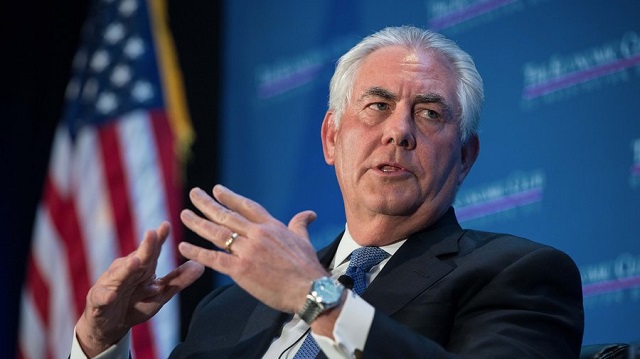
Washington, United States | AFP | Washington’s top diplomat set off for Africa on Tuesday to tour countries that form a new theater for competition with America’s ambitious great power rival China.
Secretary of State Rex Tillerson’s trip to Ethiopia, Kenya, Djibouti, Chad and Nigeria will take him to new battlefields in the United States’ long war against Islamist extremism.
But looming over the journey will be a different and arguably more important long-term challenge — the rise of China as an economic and diplomatic power to rival the West.
In a low-key speech to the George Mason University in Virginia before setting off, Tillerson insisted on the importance of Africa to America’s interests.
“Our country’s security and economic prosperity are linked with Africa’s like never before,” he said, noting the continent’s rapid population increase and growing economies.
But he spoke mainly in generalities, and State Department officials played down the idea that the exploratory trip will produce any “deliverables.”
Critics, meanwhile, stressed that recent US engagement with the continent has been led by the Pentagon and focused too narrowly on ongoing counterterrorism battles.
And they noted that Tillerson’s own plan to slash the State Department budget for diplomacy and aid by 30 percent leaves him ill-prepared to match China’s targeted investment.
Just as he had done before leaving for Latin America last month, Tillerson warned African countries that Chinese interest in their economies is not disinterested.
While America, he argued, seeks to build partnerships with African countries “by incentivizing good governance”, China’s approach “encourages dependency.”
He accused Beijing of entrapping African governments with “opaque contracts, predatory loan practices, and corrupt deals that mire nations in debt.”
– ‘Three Ds’ –
US officials want to meet their Chinese counterparts to coordinate assistance to and investment in Africa, in particular to use its infrastructure building expertise.
But China is already heavily involved in Africa and, for all its wealth, America is losing ground.
US exports to Africa fell last year to just under $22 billion, down from $38 billion in 2012, when Washington had a slight trade surplus with the continent.
In 2016, Chinese exports to Africa were more than $80 billion and imports from Africa less than half that.
Xi Jinping’s government plans to give $60 billion in loans and export credits to African countries before 2020 and Chinese loans already far outstrip those of the World Bank.
And, while America’s military commitment to wars in various African hot spots remains impressive, China recently opened its first overseas naval base in Djibouti.
 The Independent Uganda: You get the Truth we Pay the Price
The Independent Uganda: You get the Truth we Pay the Price





